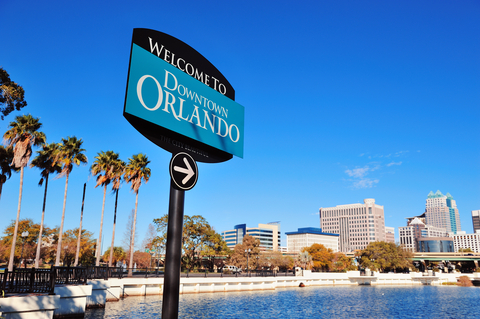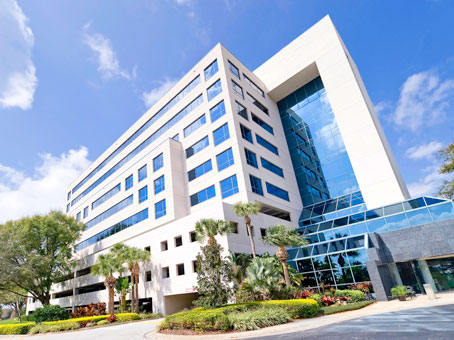
[Updated Oct 2020] A guide to executive suites and office space to rent in Orlando as well as general information that may be useful if you are considering renting office space in the city.
For further Orlando offices information or to search office space to rent in Orlando just click. Or contact us for any office space search inquiry.
History & Geography
As the fifth largest city in Florida and the state’s largest inland city, Orland is a regional hub of both culture and commerce. Nicknamed ‘the city beautiful’, Orlando is in the north-east of Florida and is built on wetlands consisting mostly of lakes and swamps. The largest lake in the vicinity is Lake Apopka. The region surrounding Orlando was originally inhabited by the Native American tribe, the Creeks. Europeans first settled in the area in 1536. By the mid 19th century there as a sizable settlement known as Jernigan, named after the first permanent settler to the area, Aaron Jernigan. However, in 1857 the town became known as Orlando, named after Orlando Reeves, a soldier who died in the area during the Second Seminole War. As the 19th century progressed Orlando grew in size and importance, however, was severely affected by the blockade during the American Civil War in the 1860s. However, the period following the Civil War saw Orlando’s population increase dramatically and it was officially incorporated as a town in 1875 and then a city in 1885. Around this time a huge citrus industry grew up around the city, ensuring prosperity and a further population spike. In the early 20th century Orlando became a favoured vacation destination and the city experienced a construction boom. During WWII the Orlando Army Air Base was built and the city became home to a large population of servicemen. In 1965 Walt Disney announced that it was to build Disney World in Orlando. This proved to be a very significant event for the city and its economy. The resort opened in 1971 and Orlando’s population spiked once more. The economy also benefitted hugely and tourism became the most important industry for the city. Today Orlando is still a top tourism destination as well as being a sophisticated and dynamic city for its resident and the businesses based there.
Economy
Orlando has one of the healthiest and most diversified economies in Florida. One of the bulwarks of the local economy is the city’s hi-tech and industry sectors. Over 53,000 people are employed in the hi-tech industry alone, and it is worth USD 13.4 billion. The Central Florida Research Park is one of the largest of its kind in the country and is a hub of the defense industry. Among the companies which have research facilities in Orlando are Lockheed-Martin, General Dynamics, Siemens, Mitsubishi Power Systems and Symantec. Many residents of Orlando work at Patrick Air Force Base, Cape Canaveral Air Force Station, and Kennedy Space Centre. Another major part of Orlando’s economy is the film and TV sector. Universal Studios and Disney’s Hollywood Studios both have a major presence in the city. Orlando also has a large video game industry, with Electronic Arts also having a presence. Finally, Orlando relies heavily on the tourism industry. Tourism has become a crucial part of the city’s economy, with almost 50 million visitors coming to the city every year, attracted by Orlando’s plethora of theme parks and resorts.
Tourism & Culture
Orlando is one of Florida’s primary tourist attractions. The city regularly brings in numbers which rival its contemporaries such as Miami and Tampa. Orlando’s resorts bring in a large portion of the tourists which visit the city. The three primary attractions are Walt Disney World Resort, Universal Orlando Resort, and SeaWorld Orlando. The city has also become a top destination for conventions, which also attract thousands of visitors to the city. In fact, only Chicago and Las Vegas can rival Orlando for conventions in the US. After Las Vegas, Orlando has the most amount of hotel rooms in the country. Recently the Waldorf-Astoria Orlando opened its doors, the first Waldorf-Astoria built from the ground up since the chain’s flagship building in New York. Orlando also has a lively music scene, consisting of hip hop, rock music, metal and reggae. The city is known for its nightlife and has a wide selection of bars, restaurants, and clubs. A large number of shopping malls and outlets are also present in the city, and Orlando has the reputation of being a retail hub. The city’s year-round warm climate, relaxed atmosphere, and range of activities for all tastes have combined to make it one of the top tourist cities on the east coast.
Transportation
Orlando’s main airport is the Orlando International Airport, the second busiest airport in Florida after Miami. Orlando International serves as a hub for Southwest Airlines, JetBlue, and Frontier Airlines. Many residents of Orlando choose to drive, however, the city has notorious problems with gridlock and overcrowding. Both Amtrak and CSX Transportation run lines to Orlando, connecting to the rest of the state and the country. There have been attempts to build a light commuter rail in the city, but these have always met with resistance and have come to nothing.

Orlando’s overall office market has been seeing signs of improvement of late. Vacancy rates in the city have declined markedly following the overall trend and leasings in the CBD are up. Many tenants have been moving from Class B to Class A office space and renewals are up from the previous few years. With vacancy rates declining many have predicted that landlord concessions will also tighten up. Vacancy rates now stand at approximately 14 percent. Rental rates have stabilized recently but are predicted to slowly increase over the next several years.
Our office space search, advisory and acquisition services are FREE, always. We are globally regulated by the Royal Institution of Chartered Surveyors (RICS) ensuring the highest standards of commercial property advice and service at all times.
